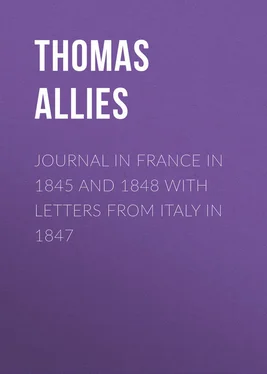Thomas Allies - Journal in France in 1845 and 1848 with Letters from Italy in 1847
Здесь есть возможность читать онлайн «Thomas Allies - Journal in France in 1845 and 1848 with Letters from Italy in 1847» — ознакомительный отрывок электронной книги совершенно бесплатно, а после прочтения отрывка купить полную версию. В некоторых случаях можно слушать аудио, скачать через торрент в формате fb2 и присутствует краткое содержание. Жанр: foreign_antique, foreign_prose, на английском языке. Описание произведения, (предисловие) а так же отзывы посетителей доступны на портале библиотеки ЛибКат.
- Название:Journal in France in 1845 and 1848 with Letters from Italy in 1847
- Автор:
- Жанр:
- Год:неизвестен
- ISBN:нет данных
- Рейтинг книги:4 / 5. Голосов: 1
-
Избранное:Добавить в избранное
- Отзывы:
-
Ваша оценка:
- 80
- 1
- 2
- 3
- 4
- 5
Journal in France in 1845 and 1848 with Letters from Italy in 1847: краткое содержание, описание и аннотация
Предлагаем к чтению аннотацию, описание, краткое содержание или предисловие (зависит от того, что написал сам автор книги «Journal in France in 1845 and 1848 with Letters from Italy in 1847»). Если вы не нашли необходимую информацию о книге — напишите в комментариях, мы постараемся отыскать её.
Journal in France in 1845 and 1848 with Letters from Italy in 1847 — читать онлайн ознакомительный отрывок
Ниже представлен текст книги, разбитый по страницам. Система сохранения места последней прочитанной страницы, позволяет с удобством читать онлайн бесплатно книгу «Journal in France in 1845 and 1848 with Letters from Italy in 1847», без необходимости каждый раз заново искать на чём Вы остановились. Поставьте закладку, и сможете в любой момент перейти на страницу, на которой закончили чтение.
Интервал:
Закладка:
Of course the institutions mentioned in this journal are but samples of a multitude. None will feel more than the writer its great incompleteness. Still this is a field of observation which has been little worked; so that the mere partial breaking of its surface may produce fruit.
It may be as well to put together here the five congregations in France mentioned in different places of the journal, which are engaged in missionary work. They are "la Congregation des Prêtres de la Mission," or, "les Pères Lazaristes," Rue de Sèvres, 95.; the "Séminaire des Missions Etrangères," Rue du Bac, 120.; the "Congrégation des Sacrés Cœurs" (Séminaire de Picpus), Rue Picpus, 9.; the Jesuits, and the Maristes. The "Congrégation du Saint Esprit," for forming priests for the colonies, Rue des Postes, 26., I did not visit. These, with the "Congrégation de la Miséricorde," form all the French missionary establishments. I think no one can give even a transient look at the course of life pursued by the St. Sulpiciens for the education of the clergy, without admiration of the astonishing care of the interior life taken by them, and the pains they are at to ascertain the due vocation for so special a work.
The chief establishments of the Church for education are the grands séminaires in each diocese, for preparation for holy orders; and the petits séminaires, both under the direction of the bishops, the latter receiving boys for all sorts of professions. In these two classes of establishments alone, as a general rule, is strict attention paid to the religious training of the pupils. The royal colleges, which extend all over France, have been by all described to me as in the most corrupt moral condition, and as suffering their professors to instil systematic infidelity into their pupils. Of course the vast majority of the youth of the country is educated in these colleges. The result is seen in their lives. For the female sex, the chief congregations devoted to education are "Les Dames du Sacré Cœur," in Paris, Rue de Varennes; "Les Dames de Notre Dame" (couvent des Oiseaux, Rue de Sèvres); "Les Dames de la Visitation." Each has a great number of houses through France and elsewhere. For the poorer classes, "Les Frères de la Doctrine Chrétienne," and the various sisters of charity, are of incalculable benefit: they are very numerous, and widely spread. Their disinterested and loving labours would be the greatest of blessings to our parish priests, engaged in conflict with a hard practical heathenism on the one side, and on the other, with various forms of dissent, the essence of which may be said to consist in a complete negation of the Church's office in the scheme of redemption, and, generally, of all objective belief beyond the sacrifice of our Lord for the sins of men, and the operation of the Holy Spirit.
It will be seen throughout, that I do not consider non-appreciation of the good in the Roman Catholic faith and practice a necessary ingredient of the English Churchman's character. I am quite convinced that the reunion of the English Church with the Church of Rome would be an incalculable blessing to the whole Church of God, and to the whole human race. Whoever made the separation, we need not despair of such a reunion; the right accomplishment of which good persons, on both sides, may earnestly hope and pray for.
JOURNAL. – 1845
Tuesday, June 24. – Reached Southampton from Oxford in good time, and left by the packet at 10 P.M. We passed the experimental fleet off Portsmouth, had a very fair passage, and were at the mouth of Havre about ten: but for two hours we could not enter; the swell was considerable. At Havre, took our places to Ivetot, which we reached about half-past-nine. The country rich but uninteresting.
Ivetot, June 26. 1845. Thursday. – We called on M. Labbé a little before ten, and were with him till half-past-three. His brother is Supérieur of the Petit Séminaire, in which are 225 youths. The whole payment, on an average, is 360 francs per annum for board and instruction; some paying as little as 200 francs, some as much as 500, but no difference whatever is made between them. The children are evidently on the most affectionate terms with the masters. "There are twelve priests, a deacon and sub-deacon, and three clerks in minor orders." – M. 2 2 The observations between inverted commas, and ended with the letter M. , are taken, by permission, from the journal of my fellow-traveller, the Rev. C. Marriott.
They attend confession once a month, and it is very rare that they fail in this: this is the rule of the house; but should any avoid it much longer, his confessor would not speak to him authoritatively at all, or send for him, but rather take an opportunity of referring incidentally to his absence. This hardly ever fails. "They generally thank him for doing so, the reason being something about which they were unable to get themselves to break the ice." – M. They live entirely with their pupils; sleeping, eating, playing, teaching: in the centre of a large dormitory, with beds on both sides, was a bed, nowise distinguished from the rest save that it had a chair beside it; here the Supérieur sleeps. His salary is 1000 francs a year; that of the others about 600. They said, laughing, that it was hardly what a servant in England would receive. The Supérieur has a very pleasing and paternal aspect. We heard him catechise the children in the chapel for some time; their answers were good. Several were on the sacraments, and the reply to them definite and precise: – 'Which is the most indispensable sacrament?' 'Baptism.' 'How many sorts of baptism are there?' 'The baptism of water, of blood, and of desire.' 'Can any sacrament be administered by other than a priest?' 'Yes, baptism in case of necessity.' 'Can any other?' 'None, Sir.' 'What conditions are necessary to receive the sacrament of Penance?' 'Five.' 'Are there any of those more indispensable than others?' 'Yes, fervent sorrow for sin past, and a resolution not to offend God by sinning any more.' 'If a priest conferred absolution on a person who gave no outward sign of penitence, from his state of sickness, would it benefit him?' 'If he was able to make interior actions of the soul, it would; not otherwise.' ('The Church,' said M. Labbé in explanation, 'would prefer bestowing a sacrament often inutilement, to denying it once where it might benefit.') 'Which are the three chief Christian graces?' 'Faith, Hope, and Charity.' 'Which is the most perfect?' 'Charity.' 'Why?' 'Because it presupposes the other two' (I think); and, again, 'because it will last for ever.' 'Will Faith last for ever?' 'Non, Monsieur.' 'Why?' 'Parceque, quand nous verrons Dieu, nous n'aurons pas besoin de le croire.' 'Will you see God?' 'Oui, avec nos propres yeux.' 'You have just received confirmation; what does it make him who receives it?' 'Un parfait Chrétien.' 'Etes-vous donc un parfait Chrétien?' With hesitation, 'Oui, Monsieur.' 'Etes-vous un Chrétien parfait?' 'Non, Monsieur.' 'Quelle est la différence?' 'Un parfait Chrétien est celui qui a tous les moyens pour parvenir au salut – un Chrétien parfait est celui qui est sans péché' 'En y-a-t'il?' 'Non, Monsieur' (with hesitation). 'Non, mon enfant, il n'y en a pas.'
"The chapel is a pretty and simple building of the early decorated character, designed by Père Robert, who was formerly an engineer. The windows and buttresses are in excellent taste; and the ceiling, though of sham stone, is so well done that I doubted whether it were not real, though a look at the buttresses, after seeing the interior, would convince one of the contrary. There is a subterraneous chapel, or rather a crypt which will be one, which I like particularly. Père Robert showed us his design for ornamenting the east end of the chapel, which is in excellent taste." – M.
Читать дальшеИнтервал:
Закладка:
Похожие книги на «Journal in France in 1845 and 1848 with Letters from Italy in 1847»
Представляем Вашему вниманию похожие книги на «Journal in France in 1845 and 1848 with Letters from Italy in 1847» списком для выбора. Мы отобрали схожую по названию и смыслу литературу в надежде предоставить читателям больше вариантов отыскать новые, интересные, ещё непрочитанные произведения.
Обсуждение, отзывы о книге «Journal in France in 1845 and 1848 with Letters from Italy in 1847» и просто собственные мнения читателей. Оставьте ваши комментарии, напишите, что Вы думаете о произведении, его смысле или главных героях. Укажите что конкретно понравилось, а что нет, и почему Вы так считаете.












